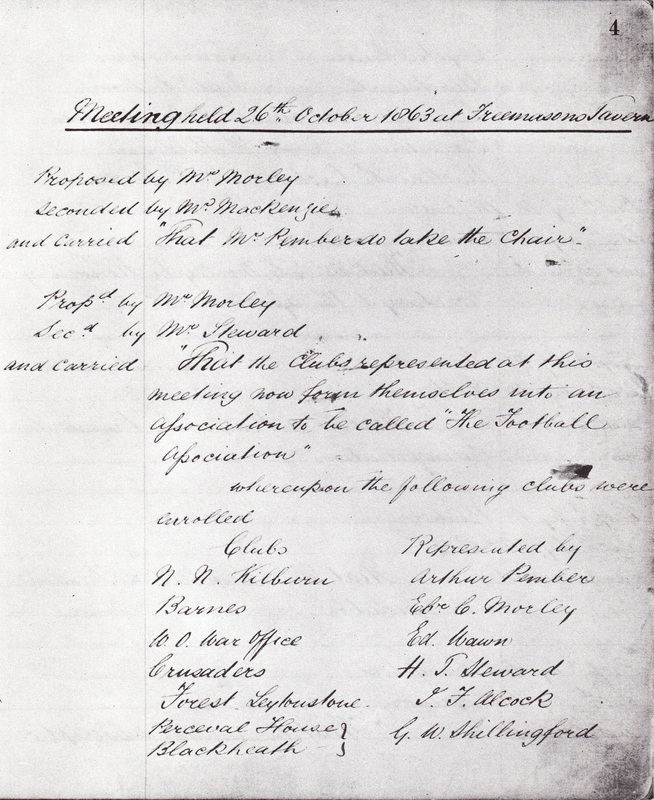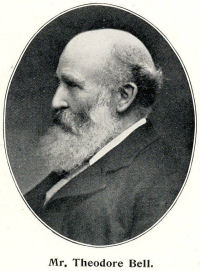Of the 15 men who gathered the Freemasons’ Tavern on 26 October 1863, some are well known, but it has never previously been established who they all were. The FA has been researching their origins, and today unveiled a plaque at Wembley in their honour, but it only records those on the first committee.
I have taken that further and for the first time have identified everyone at the meeting.
The results will raise a few eyebrows for those who thought the FA had purely London origins. In fact, only five were born in the London area, the rest coming from the places as far away as India and Australia. Although not all their schools are known, there is a wide variety including two educated in Scotland. These factors would actually have helped the FA in its discussions, as the representatives had experience of football in many different forms – and there were many.
The careers and backgrounds of the men were firmly in the affluent middle class bracket: army, civil service, legal profession, stockbrokers and architects. Several were in the drinks trade and there is a plantation owner.
They were keen sportsmen, with no less than five being rowing devotees – Morley, Steward, Wawn, Bell and Gregory were much more active with their rowing clubs than in football – while others were keen cricketers. Their age is noticeably younger than the administrators of today, with twelve of the fifteen under 25 while four were still at school. Ebenezer Morley was the oldest at 32.
Working out their identities has been a challenge to historians. The first newspaper report in Bell’s Life missed two men and noted there were also ‘several other gentlemen present who, although players, did not definitively represent any club’. The FA minute book lists more, but although they were named by Geoffrey Green in his monumental 1953 history of the FA, he compounded the error by misreading the copperplate script - for example, H Bell rather than Th Bell.
Yet they deserve recognition as their impact on sport in this country has been immeasurable. They put in place a forum for agreeing how football should be played and, in the first of seven resolutions, agreed unanimously ‘that the clubs represented at this meeting now form themselves into an association to be called The Football Association’. With those words, they created the world’s first national football body.
Here are the 15 founders:
Arthur Pember, No Names (Kilburn)
Born Lambeth, 1835-1886.
The son of a stockbroker, the captain of NN Kilburn was first president of the FA. He emigrated to the USA in the mid-1860s and had an interesting career as an investigative journalist before his early death in North Dakota.
Ebenezer Cobb Morley, Barnes
Born Hull, Yorkshire, 1831-1924.
A driving force behind the founding meetings of the FA, Morley was elected secretary for three years, then president until 1874. A keen rower, he helped found the Barnes and Mortlake Regatta as well as Barnes FC. Brought up in Hull, he moved to London as a young man and worked there as a solicitor.
Thomas Dyson Gregory, Barnes
Born Wakefield, Yorkshire, 1835-1908.
A corn merchant in partnership with his brothers Frederick and George, he was on the committee of London Rowing Club (along with EC Morley) and treasurer of the Barnes and Mortlake regatta. He was also a founder of Barnes Football Club in 1862.
Francis Maule Campbell, Blackheath
Born Blackheath, Kent, 1843-1920.
First treasurer of the FA, but soon resigned his club after failing to agree on hacking. A wine merchant, like his father (who died before he was a year old), he expanded his business to become a merchant of continental produce. Married twice, first at the age of 58, and the second time just three months before his death.
Frederick Henry Moore, Blackheath
Born Perth, Western Australia, 1839-1934.
Brought up in Australia, he came to London as a 14 year old to finish his education, and worked as a wine merchant with Dalgety and Co, his uncle’s company. One of the founders of Blackheath club, he remained in England until 1864, then returned to the southern hemisphere where he was an insurance agent and company director in New Zealand, Tasmania and Sydney.
George Twizell Wawn, War Office
Born West Boldon, County Durham, 1840-1914.
On graduating from Durham University he moved to London in 1860 to work for the War Office as a Clerk. Having rowed for his university, he also joined London Rowing Club. From the War Office he joined the African commissariat in 1873, with postings in Sierra Leone and Ghana, retiring in 1889 with the honorary rank of Major.
Herbert Thomas Steward, Crusaders
Born London, 1838-1915.
Educated at Westminster School, he was an architect and surveyor. His primary passion was rowing and he was president of Leander Club, and wrote the history of Henley Regatta.
John Forster Alcock, Forest (Leytonstone)
Born Bishopwearmouth, County Durham, 1841-1910.
After leaving Harrow, he entered the family business as a ship owner and insurance broker. He has been overshadowed in football by his younger brother, Charles Alcock, but was a useful player and founder of pioneering club Forest.
Alfred Westwood Mackenzie, Forest (Leytonstone)
Born Leytonstone, Essex, 1840-1924.
An insurance manager with Guardian Assurance, with his brother Sir Morell Mackenzie he was one of the founders of the Throat Hospital in London. Attended the FA’s jubilee dinner in 1913 and was presented with a silver casket.
Francis Day, Crystal Palace
Born Westerham, Kent, 1838-1886.
Owner of the Black Eagle Brewery in Bermondsey, succeeding his father as a partner in the company of Day Noakes & Co, together with another Crystal Palace player, Wickham Noakes. Was also a good fast bowler for West Kent.
Theodore Bell, Surbiton
Born Uppingham, Rutland, 1840-1923.
Educated at Uppingham, where he was captain of football 1857-58. Although he represented the short-lived Surbiton club at the first meeting of the FA and signed them up for membership, he was better known as a rower and was for many years the secretary of Kingston Rowing Club. A solicitor, he had a legal practice in Epsom. [NB
George William Shillingford, Perceval House School (Blackheath)
Born Purneah, Bengal, 1844-1896.
He and his brothers came to England for their education, but spent the rest of their lives back in Bengal where they ran an indigo plantation and were responsible for hunting Bengal tigers almost to extinction in the latter half of the 19th century.
Bertram Fulke Hartshorne, Charterhouse School
Born Cogenhoe, Northamptonshire, 1844-1921.
The only public school representative at the meeting and the only one to decline to join the FA. A barrister, he graduated from Pembroke College, Oxford, joined the Indian Civil Service in Ceylon, then became a District Auditor for the Local Government Board.
William John Mackintosh, Kensington School
Born Calcutta, Bengal, 1845-1923.
Born in India where his Scottish father was a merchant, he was educated at Edinburgh Academy and Kensington School. A career soldier, he won a commission with the Royal Artillery in 1867 but there is no evidence he ever saw action in 20 years’ service. He retired in 1887, with the rank of Lt Colonel, and lived out his days in Devon.
William Henry Gordon, Blackheath Proprietary School
Born Edinburgh, 1845-1929.
Educated at Edinburgh Academy, Cheltenham College and Blackheath Proprietary School, then took a degree at Trinity College, Cambridge. Qualified as a barrister, changed his surname to Lockhart Gordon and emigrated to Canada, where he was director of a major timber concern, the Canadian Land and Emigration Company.


 RSS Feed
RSS Feed